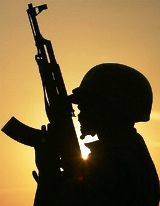US, France back peacekeeping forces to Darfur, Chad
UNITED NATIONS — The United States and France on Tuesday pushed for the speedy deployment of a UN-African Union force in Sudan’s Darfur region and urged a ceasefire during peace talks planned for next month.
 The United Nations Security Council authorized on Tuesday a European Union force and U.N. police to help protect civilians in Chad and the Central African Republic caught in the spillover from the conflict in Sudan’s Darfur region.
The United Nations Security Council authorized on Tuesday a European Union force and U.N. police to help protect civilians in Chad and the Central African Republic caught in the spillover from the conflict in Sudan’s Darfur region.
It authorizes the EU, under Chapter 7 of the U.N. Charter which allows the use of military force, to deploy a force for one year in eastern Chad and northeastern Central African Republic. The force will help improve security, facilitate the delivery of humanitarian aid, and “contribute to protecting civilians in danger, particularly refugees and displaced persons.”
Speaking at a rare Security Council summit on Africa chaired by French President Nicolas Sarkozy, US President George W. Bush said he expected Sudanese President Omar al-Beshir and Darfur rebels “to observe a cease-fire during next month’s peace talks” in Libya.
UN chief Ban Ki-moon secured Libya’s agreement to host the Darfur peace talks in Tripoli October 27 when he made a week-long trip to Sudan, Chad and Libya early this month.
Chadian President Idriss Deby opposed Secretary-General Ban Ki-moon’s original proposal for deployment of a U.N. military force but agreed to an EU force after meeting French Foreign Minister Bernard Kouchner in June.
With Deby’s approval and a green light from the Security Council late last month that it would approve the deployment, the EU has started planning for a possible 3,000-strong peacekeeping mission.
Both Bush and Sarkozy called for the rapid deployment of the 26,000-strong UN-African Union force to Sudan’s war-torn region to take over peacekeeping from under-equipped AU troops.
The US leader insisted that the Darfur conflict, which has claimed at least 200,000 lives and displaced 2.5 million people, amounted to “genocide”.
“Maybe some don’t think it’s genocide. But, if you’ve been raped, your human rights have been violated. If you’re mercilessly killed by roaming bands, you know it’s genocide,” the US leader said. “When we find genocide, it’s time to do something about it. Time is of the essence.”
The US president and Sarkozy both also expressed support for a Security Council resolution adopted earlier Tuesday endorsing sending a European Union-UN force to Chad and the Central African Republic to protect civilians from the spillover of the Darfur conflict.
Under the French-drafted resolution, 300 UN policemen are tasked with monitoring camps for Darfur refugees and IDPs, who number respectively an estimated 236,000 and 173,000 in Chad alone.
The UN police officers would be protected by the 3,000 European troops, mostly French, led by a British general.
Bush called the resolution “a step in the right direction” and a “practical solution to a big problem.”
Sarkozy, who described the Darfur crisis and its regional ramifications as a “a priority for France,” also welcomed it.
But a humanitarian source, speaking on condition of anonymity, told AFP that the EU force “must be seen as impartial and European-wide” and not as a “French initiative” that would merely serve to further prop up embattled Chadian President Idriss Deby Itno, a close ally of France.
Sarkozy also offered to send a warship off Somalia to protect delivery of international food aid to beleaguered Somalis from attacks by pirates.
Piracy is common in the waters off Somalia, which has been without an effective government since the 1991 ouster of dictator Mohamed Siad Barre sparked a bloody power struggle.
The French leader said Paris wanted a stronger partnership with the AU, including reinforcing AU peacekeeping capacities within the EU framework.
Earlier, Ban Ki-moon also stressed the importance of boosting the world body’s partnerships with regional organizations such as the AU.
He said the UN peacekeeping department was working with the AU “to develop an African stand-by-force to help maintain durable peace on the continent.”
Meanwhile Britain’s minister of state Kim Howells underscored “the need for justice” in Darfur, referring to demands by the International Criminal Court (ICC) that Khartoum surrender Sudan’s secretary of state for humanitarian affairs Ahmed Haroun, who is suspected of war crimes in Darfur.
Last May, the ICC issued arrest warrants for Haroun and pro-government Janjaweed militia leader Ali Kosheib, who face a long list of charges of crimes against humanity and war crimes. Sudan has refused to hand them over.
Summing up the significance of the council summit, the French president said France succeeded in making Africa, including Darfur, “a priority”.
“It was not easy,” he said. “If it had been so easy others would have done it before us.”
(AFP/AP)
